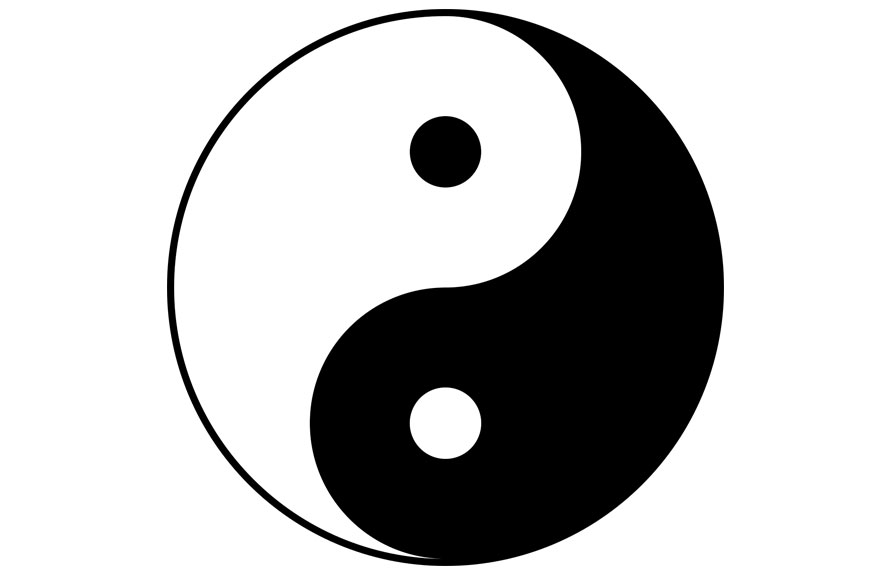Of the many virtues which we have long recognized in our culture – things like courage, humility, and integrity – an essential one that we’ve missed, maybe the essential one, is balance. This is a Western omission. In the East, particularly China, balance has always held a central place in human thought. It’s symbolized best by the yin-yang symbol we know so well, but seldom stop to really contemplate.
As the yin-yang suggests, balance doesn’t always mean moderation. After all, the yin-yang consists of black and white in balance. It’s not uniformly gray. The yin-yang suggests that there are opposites which are nonetheless connected, despite their opposition. I think the way to practice this old virtue of balance is a recognition and living out of this principle, this fundamental fact about the nature of reality. Balance, it seems to me, lies at the heart of physical, spiritual, and political health, and I think that reclaiming this virtue lies at the heart of healing our polarized culture.
Thinking of things this way requires accepting a hard truth: however firmly we hold our convictions, they are ultimately based in part on faith, as well as reason. The things we believe are not like mathematical proofs, and we can’t use reason alone to persuade others. At the end of the day, we have to make choices about our core convictions. We have to decide, using both the head and heart – reason and intuition – about what will be the best foundation for human flourishing.
As a result, people will always disagree about many core values. Does God exist? What is human nature? What political structures foster the common good? Because people will always give various answers to these questions, there will always be tension among human beings. This is normal. The key insight of balance is that these differing points of view need not be seen as threatening. Differing perspectives represent different ways of expressing different sides of the same truth or reality.
How wonderful it would be, if we could approach our philosophical and political differences in this way! Much of our political life has been wasted trying to convince ourselves and our opponents that our way is “right” and their way is “wrong.” Liberals tend to emphasize such things as equality, compassion, and community. Conservatives tend to emphasize such things as liberty, justice, and individualism. These yin-yang opposites are certainly in tension, but they’re also connected as two sides of the same coin—and that’s the insight we’ve been missing.
In practice, our views rarely fall entirely on one side or the other. In practice, our beliefs tend to be blends of both perspectives, with either a slight or a strong preference for one side or the other. For example, our debate about illegal immigration is based on the tension between compassion and justice. It is rare to find someone who doesn’t value both compassion and justice to some extent—so the disagreement becomes simply about how to balance these two opposing emphases. We usually think about our differences as disagreements about principle, and sometimes they are. But much more often, it’s not really a disagreement about values at all, but merely a disagreement about where to place the fulcrum to balance the values which both sides share to differing degrees.
I find this insight to be very powerful, and I think it can go a long way toward healing our cultural and personal polarization. However strongly I hold my convictions, there is another valid way of looking at the world. And rather than merely tolerating such a difference, I can celebrate it, because I know that it balances my own preferences and makes me a better and more complete person.
In other words, I don’t begrudgingly accept that we need balance in the world. I enthusiastically recognize that balance completes me in a sense. If my preference is to emphasize law and structure, I know someone will come along and remind me not to forget about compassion and creativity. If my preference is to emphasize the spirit of the law, I know someone will come along and whisper in my ear–don’t forget the letter! Even when my preference is very strong for one of these poles, there is still a fulcrum to place between the two, and it can be so liberating to recognize that our disagreements are rarely about good and bad, but are more frequently about balancing two goods.
I find this an exhilarating thought because it strengthens the bonds that bind us. It uses the fact that we have different opinions not as a corrosive element that weakens our connection, but as a glue that makes us all the more essential to each other. Instead of seeing each other as enemies or even as opponents in the political arena, it makes it clear that we are essential to each other’s health, and that any one perspective that grows without balance will often turn monstrous. Even our best instincts sometimes need to be checked.
Of course, this idea that balance is not only a virtue, but perhaps the chief virtue, of human life, is often counterintuitive in the West, and especially in America. We have always emphasized conflict, winners and losers, right and wrong. There are indeed different perspectives, but rather than framing these differences as dichotomies of “either/or”, we can frame them as organic wholes of “both/and”. The sooner we learn this lesson as a culture, the sooner the healing can begin.





1 thought on “The Forgotten Virtue of Balance: A Meditation”
Thank you for this article, which is a wonderful reminder of how differences between people (and their beliefs) can, when celebrated, contribute to a healthier whole.